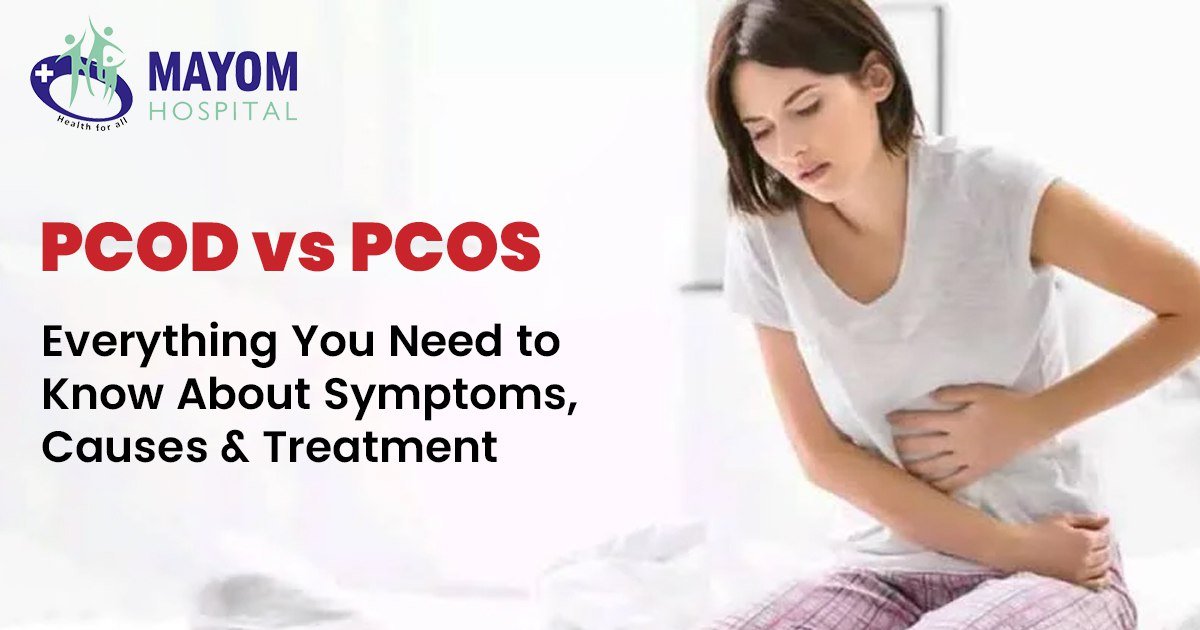PCOD vs PCOS: Key Differences, Symptoms & Effective Treatment
Women today often hear the terms PCOD and PCOS, sometimes using them interchangeably. While both conditions affect the ovaries and hormone balance, they are not exactly the same. Understanding their differences, symptoms, and treatments can help women take better control of their reproductive health. Here’s everything you need to know — explained by experts from Mayom Hospital, one of the leading centres for women’s health.
What is PCOD?
PCOD (Polycystic Ovarian Disease) is a condition in which the ovaries release immature or partially mature eggs, which can later turn into cysts. This leads to hormonal imbalance, weight gain, and irregular menstrual cycles. PCOD is primarily a lifestyle-related issue and is usually manageable with proper diet, exercise, and medical guidance.
Common PCOD Symptoms
- Irregular or delayed periods
- Weight gain, especially around the abdomen
- Hair thinning or hair loss
- Acne and oily skin
- Difficulty in conceiving
What is PCOS?
PCOS (Polycystic Ovary Syndrome) is a more severe hormonal disorder compared to PCOD. It is an endocrine condition that affects metabolism, ovulation, and insulin levels. Women with PCOS often have higher levels of male hormones (androgens), which can lead to multiple health complications if not treated early.
Common PCOS Symptoms
- Irregular or missed menstrual cycles
- Excess facial or body hair (hirsutism)
- Acne and skin pigmentation
- Infertility or difficulty conceiving
- Insulin resistance or diabetes risk
Causes of PCOD and PCOS
While both conditions are linked to hormonal imbalance, genetics, stress, and unhealthy lifestyles are key triggers. Poor diet, lack of physical activity, and high-stress levels can worsen symptoms in both PCOD and PCOS patients.
PCOD vs PCOS: The Key Difference
The main difference lies in severity. PCOD is a common condition that affects ovarian function but doesn’t always impact fertility. PCOS, on the other hand, is a hormonal syndrome that can lead to serious metabolic issues and infertility if untreated.
Treatment Options
PCOD Treatment
Lifestyle modification is the first step. Doctors recommend a balanced diet, regular exercise, and stress management. In some cases, medications are prescribed to regulate hormones and improve fertility.
PCOS Treatment
Along with lifestyle changes, PCOS treatment often involves hormonal therapy, insulin-sensitising drugs, and fertility treatments for women planning pregnancy. Early diagnosis and ongoing monitoring are essential to prevent complications.
At Mayom Hospital, women receive comprehensive care from expert gynaecologists and endocrinologists who specialise in PCOD and PCOS treatment. The hospital offers advanced diagnostic tests, personalised care plans, and counselling to help patients manage symptoms effectively.
Final Thoughts
While PCOD vs PCOS may sound similar, understanding the difference is key to managing both conditions effectively. With expert care from specialists at Mayom Hospital, women can balance their hormones, improve reproductive health, and lead healthier lives. Early diagnosis and consistent lifestyle changes remain the cornerstone of long-term recovery.
.svg)
